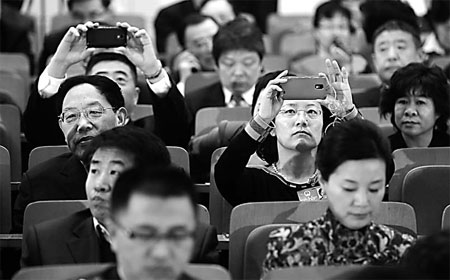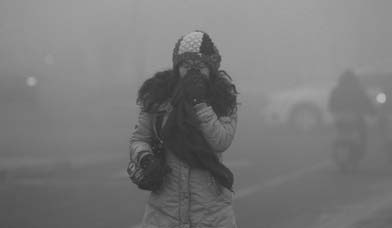Beijing vows cleaner air
Updated: 2013-01-23 07:21
By Cao Yin and Zheng Xin (China Daily)
|
||||||||

|
Deputies take photos with their cellphones at the opening of the annual session of the Beijing Municipal People's Congress, the city's legislative body, on Tuesday. Cui Meng / China Daily |
|
A woman covers her nose when walking through dense fog in Beijing on Tuesday. Bai Jikai / for China Daily |
City to reduce key pollutants by 2% in 2013
The Beijing government said on Tuesday it will continue its efforts to deal with air pollution in 2013, promising that the amount of major pollutants will decrease by 2 percent.
The capital will pay more attention to PM2.5, or airborne particles measuring less than 2.5 micrometers in diameter, to improve air quality and make the city more livable, according to a government work report published at the opening of the annual session of the Beijing Municipal People's Congress, the city's top legislature.
To reduce pollution, the heating systems of 44,000 aging single-story houses and coal-burning boilers downtown are to be replaced by clean-energy sources, said Wang Anshun, the city's acting mayor, adding that the government will also take 180,000 old autos off the road.
Qian Xiaomeng, a deputy to the congress, spoke highly of the measures and believed the aim of pollution reduction will be achieved.
"We invested much money on coping with air pollution and made some achievements, but sometimes we didn't keep the results," said Qian, who works in a city park.
Qian added she will advise the government to handle air pollution by extending green land.
The environmental issue also has the attention of another deputy, Wang Zhaoxing, who is from the China Banking Regulatory Commission.
"If the city has no fresh air, foreigners and enterprises will not run businesses here," he said.
Wang added that he hopes a new regulation on air pollution control, released for the public's comments, will be well enforced if passed.
However, some experts said the targeted reduction of pollution by 2 percent is conservative and far from enough to solve the city's air pollution problem.
Zhao Jingwei, a Beijing lawyer specializing in environmental protection, said that despite the government's efforts, the intensity of the pollution could be further reduced.
Zhao, who once handled the oil leak in North China's Bohai Bay, said he does not agree with imposing a restriction on automobile use in the city, which he believes will increase car ownership without necessarily reducing pollution.
"To make sure they can travel, residents might purchase a second car when their vehicle is forbidden from using the roads" on a certain day, he said. "This can only result in the drastic increase of car ownership and a predicament over the lack of parking spaces without reducing the amount of vehicles on the road."
Car ownership in Tokyo is higher than in Beijing, but the Japanese capital still enjoys better air, which proves that car ownership and air quality is not a causal relationship, he said.
In addition, the government cannot solve the problem by imposing more inconvenience on the public, he added.
Zhao suggested the government further raise the quality of fuel, and reduce the intensity of lead and other chemicals that might pollute the air through auto exhaust.
Zhou Rong, director of the Greenpeace climate and energy project in Beijing, echoed Zhao's sentiments.
She said it is important to figure out pollutant emission sources in the capital and make a list of them.
"Only by making clear what kinds of pollutants are contributed by a certain industry can we set out a pollution reduction plan and strive to cut down the pollutant intensity," Zhou said.
However, the capital has not yet come up with a detailed list of pollution sources, she said.
She said she was glad to see air pollution has been solved in various ways, and that the city's lawmakers had put it on their agenda, "but how to carry regulations out is more important than speaking year after year", she added.
Wang Weiping, the congress deputy from the Beijing Municipal Commission of City Administration and Environment, said air-quality improvement should depend more on coordination among departments.
"We've so many 'big' goals and 'hard' measures to solve air pollution, such as auto control, but we lack 'soft' cooperation," he said. "The problem can't only target our environmental administration, but also other departments."
Contact the writers at caoyin@chinadaily.com.cn and zhengxin@chinadaily.com.cn
(China Daily 01/23/2013 page4)

 In Photos: 7.0-magnitude quake hits Sichuan
In Photos: 7.0-magnitude quake hits Sichuan
 Li Na on Time cover, makes influential 100 list
Li Na on Time cover, makes influential 100 list
 FBI releases photos of 2 Boston bombings suspects
FBI releases photos of 2 Boston bombings suspects
 World's wackiest hairstyles
World's wackiest hairstyles
 Sandstorms strike Northwest China
Sandstorms strike Northwest China
 Never-seen photos of Madonna on display
Never-seen photos of Madonna on display
 H7N9 outbreak linked to waterfowl migration
H7N9 outbreak linked to waterfowl migration
 Dozens feared dead in Texas plant blast
Dozens feared dead in Texas plant blast
Most Viewed
Editor's Picks

|

|

|

|

|

|
Today's Top News
Live report: 7.0-magnitude quake hits Sichuan, heavy casualties feared
Boston suspect cornered on boat
Cross-talk artist helps to spread the word
'Green' awareness levels drop in Beijing
Palace Museum spruces up
First couple on Time's list of most influential
H7N9 flu transmission studied
Trading channels 'need to broaden'
US Weekly

|

|









